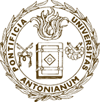


SIGNED AGREEMENT TO GIVE LIFE TO THE “ACADEMY OF CIVILIZATIONS”
A network between traditional and distance universities of the whole world to realize a common platform spreading new educational and cultural strategies
The University cannot no longer be self-centered, but it should become a real and virtual place capable of pooling the experiences of the various cultures of the world: this is the spirit with which the cooperation agreement on “Comparing Languages for a New Communication: Towards an Academy of Civilizations” was signed. The involved institutions are: the International Telematic University UNINETTUNO, the Antonianum Pontifical University, the ICDE (International Council for Open and Distance Education) and the EADTU (European Association of Distance Teaching Universities).
The signature of this Memorandum of Understanding took place during the 2016 EADTU International Conference, organized jointly with UNINETTUNO University in the occasion of its 10th Anniversary and held in Rome, at the Antonianum Auditorium, also in the presence of several Rectors of the Universities of the Arab World, including Mansoor Al Awar, of the Hamdan Bin Mohammed Smart University of Dubai.
The works were opened by the Italian Minister of Education, University and Research, Stefania Giannini: “The role of the universities – she stated - is not simply to generate and produce knowledge. The University has what I call the “third mission” that is to be open to the demands and needs of society. Distance learning – she added - is one of the main opportunities we have on our desk and should be really a very new and challenging framework in order to share knowledge and experiences in order to have a real no boundaries dimension of education”.
The idea of creating an Academy of Civilizations comes from this and, as the Rector of UNINETTUNO, Maria Amata Garito, explains: “It is a tool that will help us conducting research work on the languages of art in order to build a model of interaction and friendship with contexts belonging to different cultures. All the time – she continues – the languages of art have been used by people to open their hearts and express their feelings. This is the reason why I believe that this agreement is crucial to allow universities providing young generations with the cultural tools they need to learn, interpret and act knowingly in a more and more interdependent world where the choices of everybody have an impact at global level and where it is important to enhance social responsibility and respect for cultural, religious and political differences helping people to understand each other and overcome conflicts and difficulties to jointly create a future of peace”.
One of the promoters and signatories of this agreement is the Antonianum Pontifical University: “The agreement with UNINETTUNO and with the other distance universities – the rector, Mary Melone, stated – allows us to use computer-based platforms that represent for us a truly borderless educational offer. It is important, due to the nature of a pontifical university, to widen our vision and dialogue with the world and therefore with the sensitiveness, expectations and potentials that the world of culture and, in this case, of high-level culture as the university one, can show at global level”.
At the closure, the Minister General of the Order of the Friars Minor and Grand Chancellor of the Antonianum University, F. Michael Perry, put the emphasis on the concept of “cultural ecology”, also used by Pope Francis in his encyclical, “Laudato Si” since, he explained: “We also need to keep a balance between the “universalizing forces” and what anthropologists define as “local knowledge”. Therefore, it is not enough to make sure that this “knowledge is not, in fact, only held by those who are privileged, but is extended to every wider circles”, and respect local cultures as well.